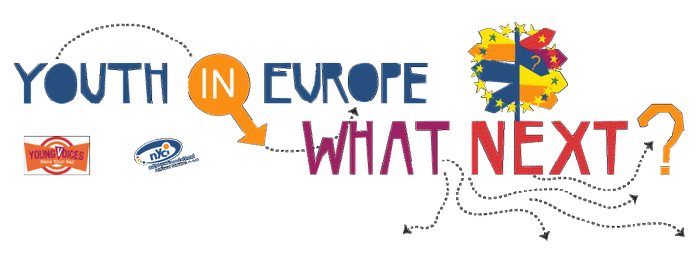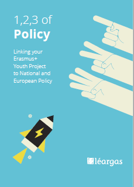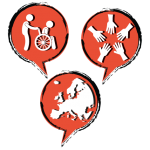The new European Youth Strategy – what’s it all about?
With all the news about Brexit, it may have escaped your attention that 2019 also sees the start of the new European Youth Strategy 2019-2027. The strategy aims to bring the EU closer to young people and to help address issues of concern to them. In this post, Anne Molloy provides you with a beginner's guide to what’s in the strategy and what’s relevant to youth work in Ireland.
Where did the strategy come from?
The strategy is based on discussions and consultation with young people and stakeholders from all over Europe. The National Youth Council of Ireland supported the consultation process with young people in Ireland through the 'Young Voices' programme.
 A draft strategy was proposed by the European Commission and finally approved by the Council of Ministers.
A draft strategy was proposed by the European Commission and finally approved by the Council of Ministers.
What’s in it?
The main aim of the strategy is to empower young people and build their resilience by focusing on three areas of action under the headings of Engage, Connect and Empower.
Engage:
The strategy recognises that providing pathways of engagement for young people in democratic life is vital for a functioning democracy and for society at large. Under the ‘Engage’ heading, the EU Youth Strategy aims to support the meaningful civic, economic, social, cultural and political participation of young people.
Connect:
The ‘Connect’ heading highlights opportunities for young people to experience exchanges, cooperation, cultural and civic action in Europe and that these opportunities need to be accessible for all young people. The strategy sees mobility of young people as an opportunity for them to:
- develop and strengthen personal, social and civic competencies
- develop critical thinking and creativity
- enhance their employability
- become active European citizens.
Youth exchanges and projects within Erasmus+, the European Solidarity Corps and their successor programmes are sources for intercultural learning and empowerment, especially for young people with fewer opportunities.
Empower:
Empowerment of young people means encouraging them to take charge of their own lives. Today, young people across Europe are facing diverse challenges. The European Youth Strategy particularly recognises the role of youth work as a ‘catalyst for empowerment’ of young people, stating that youth work brings unique benefits to young people in their transition to adulthood by providing a safe environment for them to gain self-confidence and learn in a non-formal way.
Youth Goals

The strategy also identifies issues raised by young people through the Structured Dialogue with young people around Europe. Through this process, 11 European Youth Goals were developed. These goals identify areas that affect young people’s lives and point out challenges including gender equality, mental health and wellbeing, moving rural youth forward and inclusive society for all.
What’s new?
So, what new developments can we expect at European level to implement the strategy?
- One interesting development in the strategy is the proposal to establish an EU Youth Coordinator within the European Commission. This role will channel voices of young people in the Commission, allowing young people to contribute to shaping EU policies.
- The strategy will build on the Structured Dialogue process by supporting a renewed EU Youth Dialogue process to take youth concerns into account and ensure wider outreach.
- The implementation of this strategy will include the tracking of EU spending for youth across the main EU funding programmes
- There is a particular focus on developing an agenda for youth work to further improve its quality, innovation and recognition and to allow other sectors to learn about the potential of non-formal learning.
- There are plans to have a clearer link between EU youth policy implementation and related programme activities in Erasmus+ and the European Solidarity Corps.
What does this mean for youth work in Ireland?
Fortunately for youth workers in Ireland, there are clear references and overlaps between our National Youth Strategy and the European one. There is a clear emphasis on youth participation in both as well as a shared focus on young people realising their potential and being supported in their autonomy and active citizenship as they grow into adulthood.
It is also interesting to see the commonalities between issues raised by young people in the rest of Europe and issues raised in consultations with young people in Ireland on the National youth strategy. In particular, mental health and wellbeing, the environment, education and employment are concerns shared by young people all across Europe.
And how does Erasmus+ fit in? 
Erasmus+ is one of the important ‘tools’ to implement the European Youth Strategy. With proposed increases in funding for the successor programme to Erasmus+ (from 2021) there will be more and more opportunities for youth projects that can demonstrate how they contribute to the European Youth Strategy. We want to make it as easy as possible for you to link your Erasmus+ Youth project to National and European Policy so if you'd like to find out more, contact us or consult our 1,2,3 Guide to Youth Policy.
Find out more
The European Union Youth Strategy 2019-2027 (Official Journal of the European Union)
Report on consultations with young people in Ireland on the National Youth Strategy (PDF)
Léargas 1,2,3 Guide to Youth Policy (PDF)
We welcome contributions to ‘Insights’ at comms@leargas.ie.


